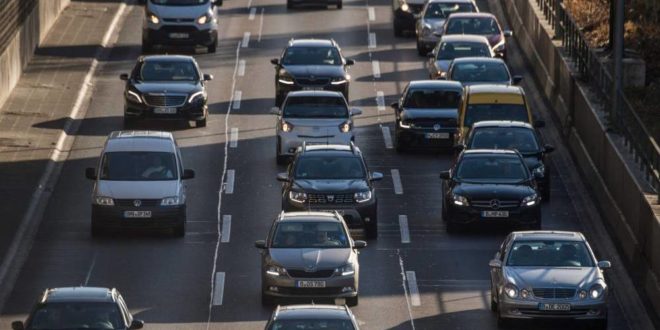The European Union and Germany announced, on Saturday, that they had reached an agreement that puts an end to a dispute over a project to ban sales of new cars powered by fossil fuels from 2035.
The historic agreement to ban sales of new cars powered by fossil fuels from 2035 is of great importance in terms of the bloc’s pioneering plan to transition to a “climate neutral” economy by 2050, with zero emissions of greenhouse gases.
But in an unprecedented move this month, Germany, the leading automaker, blocked the agreement at the last minute after it was approved in accordance with the traditional legislative mechanism of the European Union.
Berlin called on Brussels to provide guarantees that the law allows the sale of new cars that rely on fuel combustion engines, provided that they consume synthetic fuel, according to the agreement announced on Saturday.
“We have reached an agreement with Germany on the future use of synthetic fuels in cars,” EU Environment Commissioner Franz Timmermans tweeted. He continued, “We will now work to adopt carbon dioxide standards for cars as soon as possible.”
For his part, German Transport Minister Volker Messing indicated in a tweet that fuel-burning cars will remain registerable even after 2035 if they use fuel that is neutral at the level of carbon dioxide emissions.
Weeks-long negotiations between the European Commission and Germany centered around a breakthrough in terms of Berlin’s desire to extract a stronger commitment on synthetic fuels than the one contained in the initial text.
The synthetic fuels that Germany wanted exempt from the ban are still being developed and produced using low-carbon electricity.
The technology is unproven, but German manufacturers hope it will lead to broader use of combustion engines.
Environmental non-governmental organizations question the value of synthetic fuels in terms of shifting the automotive sector towards clean energy sources, and say that this fuel is very expensive, polluting, and consumes a lot of energy.
Some industry experts have expressed skepticism about whether synthetic fuel cars will be competitive in an electric vehicle market that is expected to get cheaper over time.
Audi group chief Markus Duesmann told the weekly newspaper Der Spiegel that synthetic fuels “will not play an important role in the future of passenger cars in the medium term,” even if they prove beneficial in the green transition.
Domestic politics come into play
Observers believe that domestic political calculations were behind Germany’s initial move to block the deal, to the chagrin of some of Berlin’s EU partners.
The Social Democratic Party, led by German Chancellor Olaf Scholz, leads a government coalition with the Greens and Liberals defending the move.
The Liberal Party, which has lost five regional elections in a row, is facing difficulties in the national elections and hopes to gain the support of voters opposed to the ban on fuel combustion engines.
Italy, Poland and Hungary joined Germany in a small coalition against banning combustion engines.
The European Union seeks to reduce carbon dioxide emissions from new cars through a plan for fuel combustion engines that practically requires, starting from the middle of the next decade, to rely exclusively on electric cars.
The sector has been anticipating the new EU rules by investing heavily in electric vehicles for the coming years.
 Media ININ Economy We Trust
Media ININ Economy We Trust








